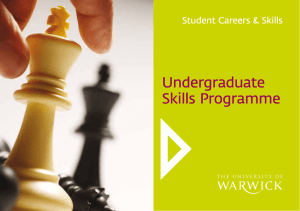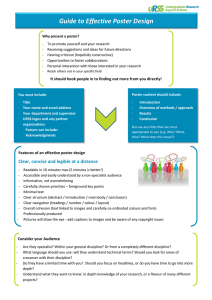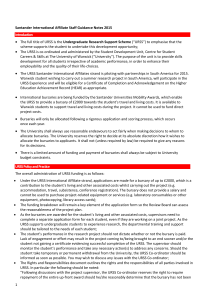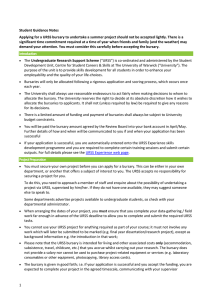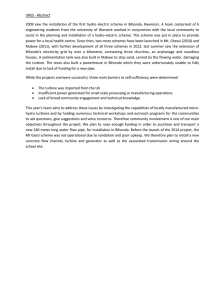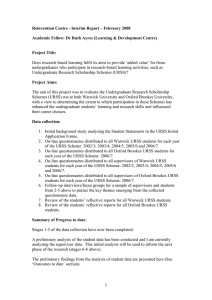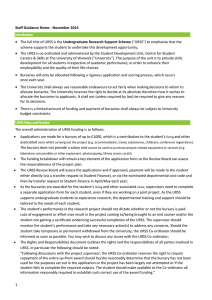Reinvention Centre – Academic Fellowship Final Report – December 2008
advertisement
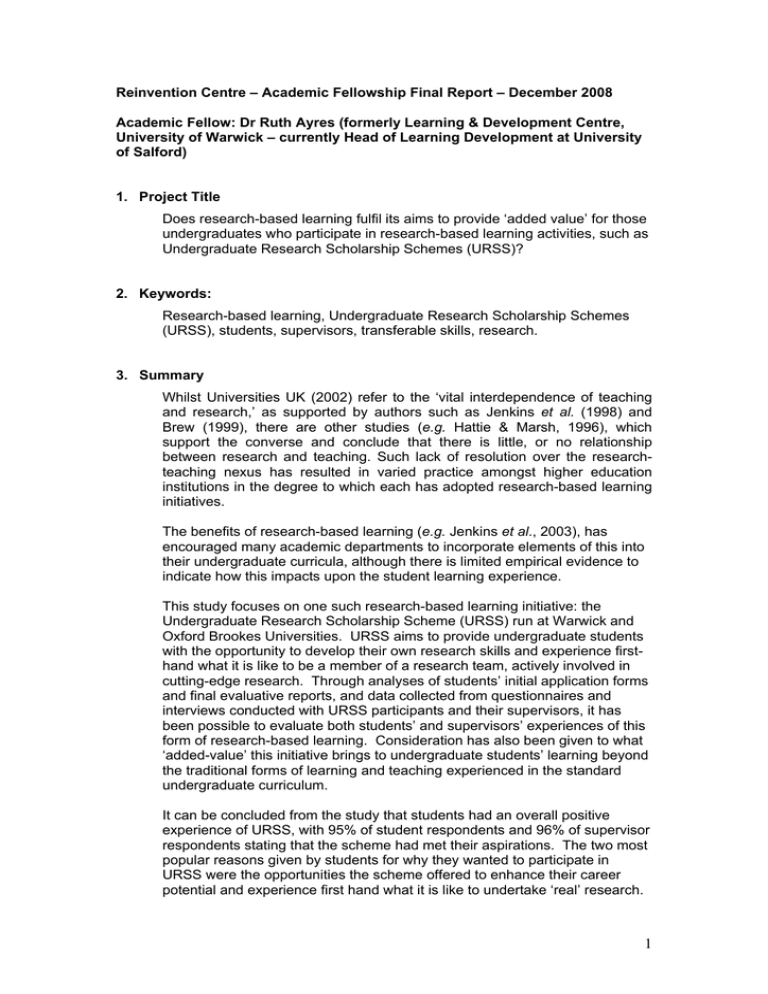
Reinvention Centre – Academic Fellowship Final Report – December 2008 Academic Fellow: Dr Ruth Ayres (formerly Learning & Development Centre, University of Warwick – currently Head of Learning Development at University of Salford) 1. Project Title Does research-based learning fulfil its aims to provide ‘added value’ for those undergraduates who participate in research-based learning activities, such as Undergraduate Research Scholarship Schemes (URSS)? 2. Keywords: Research-based learning, Undergraduate Research Scholarship Schemes (URSS), students, supervisors, transferable skills, research. 3. Summary Whilst Universities UK (2002) refer to the ‘vital interdependence of teaching and research,’ as supported by authors such as Jenkins et al. (1998) and Brew (1999), there are other studies (e.g. Hattie & Marsh, 1996), which support the converse and conclude that there is little, or no relationship between research and teaching. Such lack of resolution over the researchteaching nexus has resulted in varied practice amongst higher education institutions in the degree to which each has adopted research-based learning initiatives. The benefits of research-based learning (e.g. Jenkins et al., 2003), has encouraged many academic departments to incorporate elements of this into their undergraduate curricula, although there is limited empirical evidence to indicate how this impacts upon the student learning experience. This study focuses on one such research-based learning initiative: the Undergraduate Research Scholarship Scheme (URSS) run at Warwick and Oxford Brookes Universities. URSS aims to provide undergraduate students with the opportunity to develop their own research skills and experience firsthand what it is like to be a member of a research team, actively involved in cutting-edge research. Through analyses of students’ initial application forms and final evaluative reports, and data collected from questionnaires and interviews conducted with URSS participants and their supervisors, it has been possible to evaluate both students’ and supervisors’ experiences of this form of research-based learning. Consideration has also been given to what ‘added-value’ this initiative brings to undergraduate students’ learning beyond the traditional forms of learning and teaching experienced in the standard undergraduate curriculum. It can be concluded from the study that students had an overall positive experience of URSS, with 95% of student respondents and 96% of supervisor respondents stating that the scheme had met their aspirations. The two most popular reasons given by students for why they wanted to participate in URSS were the opportunities the scheme offered to enhance their career potential and experience first hand what it is like to undertake ‘real’ research. 1 On completion of URSS, students identified a wider range of benefits than they had considered before embarking upon the scheme, including attributes such as the development of transferable skills and enhanced personal development. 4. Activities 4.1. Background to the Undergraduate Research Scholarship Scheme (URSS) The Undergraduate Research Scholarship Scheme (URSS) has run annually from 2002/3 at the University of Warwick and from 2006/7 at Oxford Brookes University. Under both these schemes, bursaries of up to £1000 are available for undergraduate students to work with one or more members of academic staff on a piece of original research (cf. small-scale PhD project) for approximately 4-10 weeks’ full-time, (or its part-time equivalent) to gain an insight into “what it's like to be a member of a research team and take part in cutting-edge research.” Students may apply for this scheme individually; jointly with another student and/or the supervisor; or the supervisor may apply to the scheme, and if funded successfully, subsequently apply for a student to undertake the research. The aims of both schemes are very similar: 1. To experience real research work, contributing to the chosen research field and finding out what it is like to work as a member of a research team 2. To enhance research skills 3. To develop transferable skills. In addition, the Warwick scheme aims to develop students’ abilities to reflect on their own learning and achievements, and the Oxford Brookes Scheme aims to raise students’ awareness of academic research and career options in this area, whilst enhancing their employability and CVs. 4.2. Research Aim The aims of this project were to evaluate the students’ experiences of the Undergraduate Research Scholarship Scheme (URSS) run at Warwick University and Oxford Brookes University; and to determine what ‘added value’ this research-based learning initiative provided for those undergraduate students who participated in the scheme. The academic supervisors’ experiences of URSS were also considered in this study. 4.3. Method A multi-method approach was adopted for this study: 1. Documentary analysis was undertaken of the students’ initial application forms and final evaluative reports, to find out why students wanted to undertake URSS, what they were hoping to gain from the scheme and what they felt they had actually benefited from the scheme on completion of their projects. 2 2. All students and supervisors who had participated in URSS at both institutions: Warwick and Oxford Brookes Universities were sent a questionnaire to determine their experiences of the scheme (142 questionnaires were sent to students and 100 questionnaires were sent to supervisors). 3. Semi-structured interviews were held with a random sample of 12 of the student questionnaire respondents. Respondents’ data were categorised and then analysed for emergent and recurrent themes. Chi-square tests assuming equal expected proportions for gender and faculty were performed on two sets of data: The reasons students gave for undertaking URSS and the attributes they felt they had gained from URSS, in order to determine whether there were any significant gender or faculty differences. When cell frequencies were five or greater, chi-square tests were employed, otherwise Fisher’s Exact Probability Test was used, as this is more appropriate for small samples (Cochran, 1954). 5. Outcomes 5.1. Questionnaire response rates There was a 27% response rate from students and a 48% response rate from supervisors. 5.2. Student biographic data Of the student respondents: • • • 92% were full-time students 79% were in the 18-25 age group 58% were female. 5.3. Overall trends When the data were viewed overall, by far the most popular reasons given by students for why they wanted to participate in URSS were the opportunities the scheme offered to enhance their career potential (78%) and experience first hand what it is like to undertake ‘real’ research (74%). The other reasons given are shown below in figure 1.0. 3 What students hoped to gain from URSS Frequency (%) 80 Enhance career potential Experience research 60 Develop interest Work with experts Undertake something new 40 20 Develop subject-specific skills 0 Reason Figure 1.0 The reasons students gave for participating in the Undergraduate Research Scholarship Scheme (URSS) when viewed overall across both institutions. Post-URSS, students identified a broader range of attributes than they had considered pre-URSS, which varied according to both gender and faculty. These differences were analysed as shown below. 5.4. Gender differences 5.4.1. Pre-URSS When analysed by gender, the most common reasons for undertaking URSS provided by both male and female students were the chance to enhance their career potential and the opportunity to experience what real research is like. Male and female students did not differ significantly in their reasons for undertaking URSS, with the exception of one category: Significantly more female than male students thought URSS would provide them with the opportunity to develop their own specific area of interest (Χ2(1)= 4.31, P=0.039). The other three reasons given for undertaking URSS were the opportunities to: Work with experts in the field; undertake something new and different (e.g. travel abroad, undertake field work, visit locations not normally accessible to undergraduate students) and develop subject-specific skills. 4 What students hoped to gain from URSS Number of students 20 * P < 0.05 * 15 Male Female 10 5 0 Enhance career potential Experience research Develop interest Work with experts Undertake Develop subjectsomething new specific skills Reason Figure 2.0. The reasons students gave for participating in the Undergraduate Research Scholarship Scheme (URSS) analysed by gender. 5.4.2. Post-URSS On completion of URSS, students were asked to identify what they felt they had gained from participating in the scheme. The opportunity to experience what real research is like (one of the two main reasons students gave for embarking upon URSS) was the most commonly cited benefit post-URSS. The chance to enhance career potential was not perceived to be as great a benefit post-URSS as it was pre-URSS. Instead, attributes such as personal development and the development of transferable skills (neither of which had been considered pre-URSS) were ranked more highly than the enhancement of career potential. The only statistically significant gender difference observed was that more female than male students felt that URSS provided them with an opportunity to experience real research (Χ2(1)= 3.86, P=0.050). Although not statistically significant, male students, unlike their female counterparts, did not see URSS as a means to aid their degree work, develop an interest in a chosen subject/field, make a contribution to research or gain a publication opportunity. 5 16 * P < 0.05 12 Male Female * 8 4 on t ri bu tio n Pu bl ic at io n C Ex pe rts ar ee r Sp ec N ew ia lis tk n Su ow bj le ec dg t/s e pe ci fi c sk ills Ai d de gr D ee ev el op in te re st Pe rs on al R C de ve lo pm Tr an en sf t er ab le sk i lls 0 es ea rc h Number of students What students felt they had gained from URSS on completion of the scheme Reason Figure 3.0. The benefits students felt they had gained from participating in the Undergraduate Research Scholarship Scheme (URSS) analysed by gender. 5.5. Faculty differences 5.5.1. Pre-URSS When comparisons were made across faculties, the opportunities to enhance career potential and experience what real research is like were again, the two most commonly given reasons for participating in URSS in all but the Faculty of Medicine. The opportunity to experience what real research is like was not as important a reason to undertake URSS for Medicine students as it was for students from the other three faculties, such that there was a statistically significant difference between faculties for this attribute (Χ2(3)= 11.88, P=0.008). It is worth noting here, that these students in the Faculty of Medicine are graduate entry students from Warwick University and may therefore have different aspirations (and also overall experiences) of URSS from the traditional undergraduate students in the other three faculties. 6 15 Arts Medicine 10 Science Social Studies 5 0 No. students who hoped that URSS would allow them to work with experts ** P < 0.01 20 ** 15 Arts Medicine 10 Science Social Studies 5 0 Number of students 20 No. students who hoped that URSS would allow them to experience what research is like Number of students Number of students No. students who hoped that URSS would enhance their career potential 20 15 Medicine Science Social Studies 5 0 Faculty Faculty Arts 10 Faculty Figure 4.0a. The reasons students gave for participating in the Undergraduate Research Scholarship Scheme (URSS) analysed by faculty. Significantly more Science students hoped that URSS would allow them the opportunity to develop a specific area of interest (Χ2(3)= 10.8, P=0.013). Whilst not statistically significant, the opportunity to do something new and different was also ranked more highly by Science students. 15 ** Arts Medicine 10 Science Social Studies 5 0 Number of students 20 15 Arts Medicine 10 Science Social Studies 5 0 Faculty Faculty Number of students Number of students ** P < 0.01 20 No. students who hoped that URSS would allow them to develop subject-specific skills No. students who hoped that URSS would allow them to undertake something new & different No. students who hoped that URSS would allow them to develop a specific area of interest 20 Arts 15 Medicine 10 Science 5 Social Studies 0 Faculty Figure 4.0b. The reasons students gave for participating in the Undergraduate Research Scholarship Scheme (URSS) analysed by faculty. In all faculties, the development of subject-specific skills was not considered to be as significant a gain from URSS as the other attributes. 7 5.5.2. Post-URSS On completion of the scheme, students identified a wider range of gains than they had considered pre-URSS. Benefits not acknowledged until completion of URSS were: Personal development (e.g. self-confidence); development of transferable skills (e.g. Time management, teamwork, ICT skills, organisational and planning skills and effective communication and report writing); enhancement of specialist knowledge; opportunity to make a contribution to the research field; publication opportunities and help with the degree work. Through questionnaire and interview data, students identified the need to be more autonomous, independent learners in URSS, taking a greater responsibility for their learning than they do in other contexts (e.g. lectures). Whilst the opportunity to experience what real research is like remained the most commonly cited gain, or the second most commonly cited gain postURSS, personal development and the development of transferable skills were both ranked higher overall than the chance to enhance career potential. There was only one statistically significant difference between faculties postURSS: More Science students rated transferable skills as a benefit than did students from the other faculties (Fishers Exact Probability = 0.051), with no students from the Arts Faculty perceiving this to be a benefit of URSS. Similarly, only Science and Social Studies students felt that URSS provided an opportunity to enhance career potential; and only Science students felt that participation in URSS had aided their degree work. Whilst not statistically significant, it is worth noting that only Social Studies students felt that URSS had allowed them to develop an interest in a particular subject; and Arts students were the only group who felt that the scheme provided them with the chance to work with experts and gain publication opportunities. Arts and Science students were the only groups which felt that they had made a contribution to the research field. 8 No. students who felt that URSS had enhanced their personal development No. students who felt that URSS had provided the opportunity to experience real research postURSS Arts 6 Medicine 4 Science 2 Social Studies 0 10 8 6 Medicine 4 Science 0 4 Science Social Studies 0 Medicine 4 Science 0 Arts 6 Medicine 4 Science Social Studies Faculty 0 10 8 Arts 6 Medicine 4 Science Social Studies 2 0 Faculty Arts 6 Medicine 4 Science Social Studies 2 0 Faculty 10 8 Social Studies 2 No. students who felt that URSS had enabled them to develop an interest in a particular subject No. students who felt that URSS had aided their degree work Number of students 10 0 Science Faculty No. students who felt that URSS had allowed them to enhance their specialist knowledge 2 Social Studies 2 Faculty 8 Arts 6 Number of students 2 Medicine 4 No. students who felt that URSS had allowed them to develop subject-specific skills Number of students Medicine Number of students Arts 6 Arts 6 Faculty 10 8 * 8 No. students who felt that URSS had enhanced their career potential post-URSS 10 8 10 Faculty No. students who felt that URSS had allowed them to undertake something new & different Number of students Social Studies 2 Faculty Number of students Arts Number of students 8 * P < 0.05 Number of students Number of students 10 No. students who felt that URSS had enhanced their transferable skills 10 8 Arts 6 Medicine 4 Science Social Studies 2 0 Faculty Figure 5.0a The benefits students felt they had gained from participating in the Undergraduate Research Scholarship Scheme (URSS) analysed by faculty. 9 8 Arts 6 Medicine 4 Science Social Studies 2 0 Faculty 10 8 Arts 6 Medicine 4 Science Social Studies 2 0 Faculty No. students who felt that URSS had provided them with publication opportunities Number of students 10 No. students who felt that URSS had enabled them to make a contribution to the research field Number of students Number of students No. students who felt that URSS had given them the opportunity to work with experts 10 8 Arts 6 Medicine 4 Science Social Studies 2 0 Faculty Figure 5.0b The benefits students felt they had gained from participating in the Undergraduate Research Scholarship Scheme (URSS) analysed by faculty. 10 5.6. Impact of URSS on students’ future careers URSS clearly influenced students’ decisions regarding their future careers. It is clear from the data that prior to participation in URSS, many students had been thinking about whether to pursue postgraduate study and/or further research work; and students used their experiences from URSS to help them make the necessary decisions e.g. ‘Before doing URSS, I knew that I wanted to do a Masters, but was rather awed and put off by the prospect of a PhD……Now I am ready to take on the challenge!’ (Arts & Humanities student). When asked how participation in URSS had affected their thoughts on their futures: • 63% said that they were encouraged to pursue further research through postgraduate study, or a job in a related research field, citing comments such as ‘Confirmed my aspiration to do a PhD’ (Science student); • 16% of respondents said that they were put off pursuing a research career, with comments frequently relating to the difficulties associated with the research process, and in particular, the difficulty of working in isolation e.g. ‘I found the world of academia really isolating and detached from the real world.’ (Social Studies student); • 21% of respondents felt that URSS had not had any impact on their future career choices. The majority of respondents were still completing their undergraduate degree studies (70%), but the career destinations of those who had graduated from their respective institutions were linked to their undergraduate disciplines, with several undertaking further research: • 11% of respondents were undertaking a PhD by research; • 3% of respondents were undertaking a postgraduate qualification other than a PhD by research (e.g. MA/MSc by research); • 5% of respondents were undertaking a taught postgraduate programme, such as a Master’s course; • 11% of respondents were employed in a discipline-related field e.g. Research Assistant in the same scientific discipline as they studied at undergraduate level; NHS FY1 doctor for a graduate from the Warwick Medical School. 5.7. Supervisors’ experience 5.7.1. Supervisors’ gains from participating in URSS The primary reason given by supervisors from all four faculties for recruiting a URSS student, was to aid them with a particular research project; and this was the most commonly cited benefit from the scheme, reported by 50% of respondents. Following on from this, supervisors felt that URSS gave students the opportunity to experience what research is really like, whilst developing appropriate research skills. The scheme also provided supervisors with the opportunity to identify future PhD students. This was particularly true in the Faculty of Science, which was the only faculty where supervisors mentioned the additional funding provided through URSS. 11 In 23% of cases, supervisors felt that they had extended their own skills/knowledge by either working with a student from a different disciplinary background from themselves, or by enhancing their skills as a research supervisor. There was a general feeling amongst the group that the opportunity to undertake real research as part of a team was something which undergraduates would not otherwise experience and this may well impact upon students’ career choices. 5.7.2. Student Selection Processes The majority of supervisors selected the best achievers for URSS using a formal process, such as asking students to write a short statement of their skills, with an explanation of why they wanted to work on the project; and/or formal recruitment procedures with interviews. 5.7.3. How students heard about the scheme Source Warwick (%) Via tutor Via e-mail (from a variety of sources) From a fellow student Via Website Via poster 50 23 Oxford Brookes (%) 38 38 20 7 - 24 It would seem, therefore, that personal contact via the tutor, or an email from the student’s department or the URSS team were the best means of recruiting students to the scheme. 5.8. Difficulties students encountered with URSS Whilst the vast majority of students (95%) felt that URSS had met their aspirations, with comments such as ‘I really enjoyed the scheme and learned a lot about [specialist topic]’ (Social Studies student) and ‘It is a valuable and rewarding learning experience’ (Medicine student), there were still some difficulties for students with the scheme. The range of difficulties highlighted were similar in each institution: The most commonly reported problems relate to students’ unfamiliarity of working more independently in a research role, with less directed supervision from a tutor; management of their own workload; developing the specific skills and depth of knowledge required to conduct the particular project, and determining the standard required for research work. This suggests that students would benefit from learning more about the role of a researcher and generic research skills and methods before commencing URSS. 12 5.9. Future Practice 5.9.1. Future Practice – Students There were two main areas of improvement recommended by students from both institutions: Firstly, students felt that the publicity for URSS could be improved, with greater prominence for the poster displays. Secondly, whilst supervision was not felt to be a problem, a number of respondents suggested that more meetings between student and supervisor would be helpful to share expectations and agree each person’s roles and responsibilities. The areas where students felt that their supervisors had been particularly helpful were: • • • • Helping with the generation of a project plan Being readily available for meetings/discussions Providing feedback and explanations and suggesting key resources Encouraging independent working. 5.9.2. Future Practice - Supervisors Supervisors from the two institutions did differ in their views on future practice: 42% of Warwick supervisors felt that the funding for the scheme should be increased, with the scheme run for a longer period of time. These areas were not picked up by supervisors from Oxford Brookes, who instead raised the need to increase the publicity of the scheme (67% of respondents) and continue the scheme into the future (33% of respondents). These differences are no doubt a reflection of the length of time that the schemes have been running at the two institutions. 6. Implications There has been much debate in the literature over the value of linking research with teaching (e.g. Brew, 1999; Jenkins et al., 1998; 2003 & Hattie & Marsh, 1996). The results presented here indicate that the students gained a much broader range of benefits from participating in URSS than simply developing research skills and developing specialist knowledge about the topics studied, including in particular the enhancement of transferable skills and personal development attributes, such as self-confidence. e.g. ‘Not only did I learn a lot from the scheme in terms of transferable skills, but I was also able to gain invaluable insight into what research entails.’ (Science student) and ‘I hoped to get a better feel of academic research, which I definitely did. I hoped it would improve my lab work and report writing which it did.’ (Science student). This ‘added-value’ of URSS has clearly given students the opportunity to be more actively involved in the learning experience, contributing to the production of knowledge and taking on a more autonomous and independent role than they would normally have in other traditional learning situations, such as lectures. This encapsulates one of the aims of research-based learning (Healey, 2005). Other institutions may want to adopt a similar scheme to URSS to promote and enhance the development of research skills amongst their undergraduate 13 students. The institution would need to decide whether such an initiative should be rolled out to all undergraduate students and accredited through the undergraduate curricula, or whether it should run as a separate initiative, as is currently the case at Warwick University and Oxford Brookes University. There is also scope for students to decide themselves whether to accredit their work on such schemes towards their final degrees. This was the case with some of the Oxford Brookes students in this study, who used their URSS work as part of an Independent Study module, where there was provision within their undergraduate degree programme to undertake a module by Independent Study. Research-based learning initiatives such as the URSS clearly need support at an institutional level, given the associated resource implications. Involvement from the Reinvention Centre allowed the Undergraduate Research Scholarship Scheme to expand, such that a greater number of projects were funded, providing increased opportunities for undergraduate students to undertake real research. The data suggest that the published aims of the URSS are being fully met at both Warwick University and Oxford Brookes University, with much support from those undergraduate students and academic supervisors who have participated in the scheme. As such, it is hoped that the URSS will continue to run and support the learning of undergraduate students in the future. 7. References Becher, T. & Trowler, P. R. (2001). Academic Tribes & Territories: Intellectual Enquiry & the Culture of Disciplines. 2nd edition. SRHE & OUP. Blackmore, P. & Cousin, G. (2003). Linking teaching and research through research-based learning. Educational Developments, 4 (4), 24-27. Braxton, J. M. & Hargens, L. L. (1996). Variations among academic disciplines: Analytical frameworks and research. Higher Education: Handbook of Theory & Research XI, 1-45. Brew, A. (1999). Research and Teaching: Changing Relationships in a Changing Context. Studies in Higher Education, 24: 3, 291-301. Brew, A. (2001). The Nature of Research Inquiry in Academic Contexts. London: Routledge Falmer. Cochran, W. G. (1954). Some Methods for Strengthening the Common Χ2 tests. Biometrics, 10, 417-451. Hattie, J. & Marsh, H. W. (1996). The Relationship between Research & Teaching: A Meta-Analysis. Review of Educational Research, 66: 4, 507-542. Healey, M. (2005). Linking Research and Teaching Exploring Disciplinary Spaces & the Role of Inquiry-based Learning, in Barnett, R. (ed). Reshaping the University: New Relationships between Research, Scholarship & Teaching., pp. 30-42. Maidenhead: McGraw-Hill/OUP. 14 Jenkins, A., Blackman, T., Lindsay, R. & Paton-Saltzberg, R. (1998). Teaching and Research: Student Perspectives and Policy Implications. Studies in Higher Education, 23, 127-142. Jenkins, A., Breen, R., and Lindsay, R. with Brew, A. (2003). Re-shaping higher education: Linking teaching and research. London: Routledge Falmer. Lindsay, R., Breen, R. & Jenkins, A. (2002). Academic research and teaching quality: the views of undergraduate & postgraduate students. Studies in Higher Education, 27 (3), 309-327. Roberts, G. (2002). SET for success: The supply of people with science, technology, engineering and mathematics skills, available at http://www.hmtreasury.gov.uk/d/robertsreview_introch1.pdf (last accessed 19.11.08). Universities UK. (2002). Response to DfES Discussion Paper on Higher Education. London, Universities UK. 8. Contact details Dr Ruth Ayres, Head of Learning Development, Information & Learning Services, University of Salford, Greater Manchester, M5 4WT. Email address: r.ayres@salford.ac.uk 9. Acknowledgements Thanks to the Reinvention Centre for funding this project; Eve Uhlig for her help in the collection and collation of data; and URSS participants and supervisors for taking part in the research. 15
